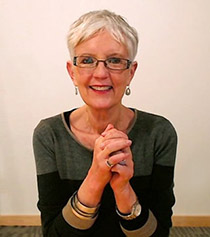Strategies to Treat Patients Trapped in the Freeze Response
 |
with Bessel van der Kolk, MD;
|
 |
with Bessel van der Kolk, MD; Stephen Porges, PhD; Ruth Lanius, MD, PhD; Pat Ogden, PhD; Thema Bryant-Davis, PhD; Bethany Brand, PhD; Deb Dana, LCSW; Janina Fisher, PhD; Kathy Steele, MN, CS; Ruth Buczynski, PhD
Sign up for a Gold Membership

This is a learning community for practitioners. We can’t wait to hear what you’re going to use with your clients
But please do NOT:
- seek advice for personal problems
- ask for referrals
- post links or advertise a product
- post about technical problems
Thank you for making these cutting-edge trainings available!
From what I learned in today’s session, I will be better able to identify when my students/clients are entering a freeze state related to their trauma(s). And I’m so excited to have learned some of the specific interventions and tools for helping them navigate that experience; to help them move out of a frozen state, slowly and carefully, without triggering further stress and immobility; to bring the past into the present in such a way that perhaps they can complete the actions that were stopped during the trauma; to help them know that their response was adaptive, and thus worthy of compassion; and to help them to plan for how to move through the experience of freezing the next time it happens. I truly love these presenters and appreciate you all so much for sharing your compassion and experience; so more of us can help liberate our clients from suffering and thus help to heal families and communities.
I am trained as a counselor but work in another field. I signed up for this course because Dr. van der Kolk’s book gave me invaluable insights into my own trauma history and how it is inextricably tied to my body’s responses (I almost said problems but reframed it). I can be a challenge as a client because I understand therapy from a higher level. I found this relevant to helping my self-soothing techniques when I freeze, and also to aid others I encounter who may be in this mode. Today, I thank my body for its ability to function to avoid danger and these practices to allow my mind to regain agency.
Thank you so much for this opportunity to watch this module. So informative. Looking forward to the next module. Wondering if there is any way to purchase the program in two payments given the exchange rate makes it almost 400.00 Canadian.
I am awed by this presentation. The content is invaluable and also the presentation style with input by so many experience and articulate practitioners and then their ideas summarised again by you. Thank you, thank you, thank you.
Very helpful. I have learned so much more on freeze and thanks for all your generosity to share your knowledge.
Looking forward to the other modules.
A great reminder of how to work with ‘shut down,’ particularly HOW to foster a sense of agency for my client. Brilliant session.
Thank you for this module in the Freeze Response, I can see where some of these strategies will help 4 of my patients who often disassociate and feel stuck.
Tracy Springer, MS, LPC, CSAC
THANK YOU. I be more mindful in session that brain and body work in unison and to notice whether it’s time to talk or time to physically feel or move. It’s easy to forget that our session is happening in real time, not the past.
This was truly wonderful and aligns with what I know to be true about trauma responses and a strength based approach for those responses. Thank you for the collaboration of leaders in the field and the wealth of content offered. I am truly grateful!
Thanks for sharing this great strategies. I work with survivors of human trafficking, and this content is extremely important and helpful!
Bless you for the work you do, thank you.
I am an educator working now with college students and this seminar was very practical and valuable! Thank you;)
It’s tough to be in post-secondary these days isn’t it?! Our students are so often so stressed, they are so often in either flight, fight or freeze; none of which are conducive to learning as the logical mind is offline…..
I will be able to help direct care workers be aware of the specific freeze responses in the people they are supporting. I will also be able to (without necessarily verbal communication) help the developmentally disabled people I work with deal with their freeze responses.
Thank you Ruth and everyone else who contributed. That was just lovely and so well structured and integrated. I very much look forward to the other sessions. With gratitude, Sarah (Melbourne, Australia)
Thank you so much, really such a rich information and beside, so wonderfully organized, thank you Ruth, you are marvelous….
Amazing. Such a well thought out and comprehensive presentation. Loved the way multiple practitioner stories and skills were interwoven into the delivery of each message. Looking forward to the next one.
This was a great webinar. I am so glad to hear that the understanding, research and new lens in which to view trauma has been shared. I am eager to learn more. Thank you!
So helpful! Learned a number of things that I can begin using with clients and the freeze response. Love learning from the experts! Thank you Ruth for all the great training that you are doing/organizing!
Highly informative. Thank you all for sharing your knowledge and insights.
brilliant thankyou – very practical – skills to take away – very clearly presented – such a wealth of skills and experience
Very well done. Easy to follow. Well organized presentation. Thank you.
I wish there was more help for people who are so severely traumatized they are unable to work, and therefore struggle to pay for therapy. As someone with complex trauma and dissociation as well as chronic illness, I am struggling to stay hopeful for my recovery when there are so few options for people like me.
Great presentation and I found it very useful. One question is that using telehealth will impede implementing some of the recommendations.Specifically measuring oxygen and possibly grounding through objects in office.However grounding ,eye movement and micro movements are very useful.
This helps me to understand and to connect in a safe, nonthreatening manner with a precious young woman. She is on the autism spectrum and experiences freeze mode.
Thank you all so much. I’m so grateful?
Several of my folks are autistic as well and I see a freeze response as one that is very common for them to experience.
I found the session very good as it mede me remember to use my bio feed back traing more. I already use the skills identified, however it made it more centred for me. I enjoyed the session greatly and look forward to the next one. Will be doing gold package later today. As an Australian this type of training is often not available to those in rural areas who deal with bushfires, road accidents, exual abuse etc.
VERY HELPFUL AND STIMULATING -I HAVE LEARNED A LOT AND THIS IS MAKING BE MORE AT EASE TO WORK WITH ALL THE ASPECTS OF THE TRAUMA.
MANY THANKS.
MICHEL LEMIEUX, M.F.T. ( QUEBEC )
Thankyou for this session. I have completed a Trauma series with NICABM before. This furthers that training so well. It also made me realise that I have been doing some of this innately eg. deep compression on a client’s hands when they are frozen (with their permission) and just leaving them there til I feel their body start to relax. I tell them, “My energy will help your body’s energy. It will help hold you through this right now.” As I ‘relax ‘into’ the patient’s energy, our breathing starts to go in synch. So without having to say anything about their breathing, they start to breathe like me. I don’t look them in the eyes. I can sense that would be too close for them to bear. I look at our hands and just ‘feel’ this person having a difficult time right now. Timing of it is so critical. It only happens well into a session, when I sense a client is having trouble with their energy. It’s very flat and they feel ‘stuck’ or frozen. It can help the client stop going into a collapses or dissociated state in session. It connects us gently and compassionately. In a few minutes, the client seems to ‘come back on line’ and they breathe a sigh of relief. I tell them, I am going to slide my hands back off you, is that okay or would you like me to leave them there a bit longer. This lets me know if the client’s thinking brain is back online and is empowering for them when they may not have felt in control til this moment. Looking forward to the next sessions.
Very helpful first session in terms of opening my mind further to mind/body interventions, as well as helping me better understand my own freeze responses and traumatic past. Thank you.
Superb. And I’d done your full trauma workshop I bought with you a few years back and wondered if this would seem redundant. Not at all.
I have a question for Pat Ogden: In getting in touch with her own alignment and movement and, as she suggested, getting her spine moving while facing a client in freeze-mode, does she find that, in addition to getting the therapist in receptive mode, this can have a mirroring effect that elicits movement in the client who may be peripherally aware of the therapist’s own movement – as ‘power of suggestion’?
I work with children and young people and I learnt a lot about using movement especially micro-movements and eye-gaze. I am an occupational therapist and I have completed modules of sensory integration therapy. I use deep pressure sensory strategies a lot of times in practice but it was really amazing to know about the subtleties of it. Thank you
Fantastic information, also to check in with one’s self our own response to our client/family member, to their freezing, great tips on what and what not to do, thanks
Thanks so much for this class. It has already shed light on how I might be present with three clients with whom I have worked. What a privilege to learn from so many great minds. Kind regards.
I have previously used breathing exercises, and I’m glad to have more strategies available such as eye movements. I love that the cadence of the voice can itself be a treatment. Thank you for all the wisdom and techniques you shared.
So very useful. and matches everything I’ve experienced working with trauma. One question — when the client has experienced a traumatic loss — hearing, as a child, of the and death of a parent — is this different in treatment and in what ways to those that did have an overtly physical component?
Excellent!! I was glad to hear you speak of people in other disciplines and jobs that this information could help. I am a Chaplain in a woman’s prison, and many of these women have been traumatized by sexual abuse, verbal abuse, and the trauma of being imprisoned. I am grateful for these insights.
I’m an executive coach and clergy for the construction industry, working mainly with men who are not known to be easy communicators. Being able to discern between them simply preparing to speak and an actual freeze response is very helpful.
I’m a journalist and trauma comes up in a lot of my reporting and I’m currently interviewing a lot of people with PTSD. This session was really helpful for what to do/avoid when interviewing people. Thank you!
I am going to work on prosody, to be more mindful of my tone of voice with my clients. I like how it was described to talk like a melody and to keep it soft.
I am also going to use more grounding language
I would have become defensive before when a client froze. I would have thought poorly about myself as a psychotherapist. Now, I can re-frame it as a resource, and have concrete skills with which to approach the person. Thank you! I have more confidence.
Well thought out and delivered online platform.
Really appreciate the “RoadMap” to focus my note taking.
Amazing that this program is available for me free of cost during this time.
The webinar was informative and the strategies for working with trauma logical and accessible.Thank you for sharing your experience!
Thank you. The first session was really insightful and I can’t wait to hear the rest. This will become a useful tool for my occupational therapy tool box as I embark on my first mental health job.
Use the micro-interventions to help clients work through their freeze. Use grounding processes and techniques to show safety and work to becomes a right-brain/right-brain therapist.
Real great presentation! I loved a client is not a problem to be solved but an experience!
Fantastic
Incredibly useful presentations, really enjoyed watching them. Fantastic ideas for helping some of my clients
Wonderful additions, Janina’s and Ruth’s contribution today. Thanks to ALL contributors to todays webinar.
This is an excellent program. I have learned so much. Now I can recognize many patterns that I didn’t understand before, and I realize I responded inappropriately in the past. But, thanks to this series, I now have the information/techniques to recognize the behavior patterns and respond appropriately. Unfortunately, I can’t afford to sign up for a Gold Session, but I will continue to attend these sessions and take notes. I know this information is helping me as much as the people I am trying to help..
have been reading books regarding trauma & did so because ‘normal’ therapy was not working… so grateful to be able to summarise all that information by those same authors in this way… Will definitely use the grounding skills and be more aware of not being intrusive… also appreciated the aspect of ‘pace’ when working with clients in Freeze… Thank You sooo much for this opportunity… would love to pay for this webinar but converting our currency to Dollars is a bit much currently…
Simply working with the tension present in the body and focusing on it and the impulse towards expression and movement inspired me very much. In addition, I am looking forward to the differentiation of freeze response and dissociation and the respective skillful interventions. One of my clients wakes up in the morning in a kind of freeze or dissociated state of body and mind and I would like to find helpful experiments to dissolve this.
Thank you all at NICABM so much for these clear, concise professional & multi-modal resources. I am a practitioner – an art therapist of many years – currently (following severe economic cuts to funding the sort of work I do & now pandemic restrictions) in the category of not being able to sign up for the gold package, so I wish to heartily thank everyone who does sign up for helping to make these courses freely accessible. I can at least recommend this to other colleagues. Meanwhile please know that practitioner-supervisor-trainers like myself are so supported by such courses & this work does radiate out into the world. And what is the glorious music you end the video with?